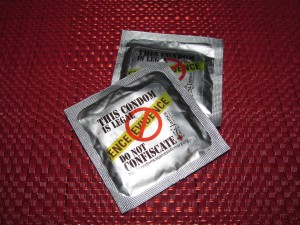“Sex workers on the street are telling us that they are having unprotected sex with clients as a result of this practice,” said Megan McLemore, Senior Researcher at Human Rights Watch.
In L.A., New York and Washington, police confiscated the condoms and used them as evidence, but San Francisco police instead photographed the condoms before giving them back to sex workers. “They have some awareness that they shouldn’t actually be taking away the condoms permanently but we still consider that to be a confiscation because the condoms are seized,” McLemore said. “They’re targeted as evidence, and it still has the same chilling effect on people who don’t want to be harassed for condoms,” she added.
San Francisco’s anti-prostitution enforcement also differs from that of the other cities by targeting prostitution less on streets and more in businesses such as erotic dance clubs, massage parlors, and transgender nightclubs.
According to the report, the focus on businesses has interfered with the clubs' willingness to have condoms available on their premises in a few cases.
“This undermines the efforts of the San Francisco Department of Public Health which has specifically targeted sex workers and transgendered women ... for part of their condom distribution campaign,” McLemore told me.
The Centers for Disease Control and Prevention says the consistent use of condoms is highly effective in preventing the transmission of HIV and other sexually transmitted diseases.
But according to McLemore, many sex workers that her team interviewed were afraid to carry more than three condoms, meaning they might run out -- putting them at risk of having unprotected sex with clients.
“Nowhere in the country is it illegal to carry above a certain number of condoms,” McLemore said. “That was the misinformation. That was another consequence of this.”
Tuesday afternoon, Officer Albie Esparza, public information officer for the San Francisco Police Department acknowledged the department's policy to photograph condoms as evidence for prostitution charges.
Last week San Francisco Police Chief Greg Suhr sent a department-wide memo reminding officers "not to confiscate unopened condoms." But the memo added that officers may photograph condoms to establish "probable cause for 'Loitering for the Purpose of Prostitution."
McLemore says Human Rights Watch plans to continue its research in other California cities including Oakland. “There have been some reports in Oakland," McLemore said. "They weren’t consistent enough during the time that we were researching this report to include Oakland but that doesn’t mean that it is not happening in Oakland."
Naomi Akers, Executive Director of San Francisco's St. James Infirmary -- a health care and social services agency for sex workers -- is in Washington to attend the AIDS conference. Her goal is to raise international awareness about human rights for sex workers. Locally, she also said she hopes to meet with the SFPD to discuss policies around condoms.
McLemore is pushing for such a meeting to happen but says it must also bring together the District Attorney, Department of Public Health, and other members of the community to make sure that public officials follow through in taking action.
“The next step is to work with advocates in each of the cities to develop a specific advocacy plan and some goals and some targets and start meeting with public officials and pushing them to take action,” McLemore said.
